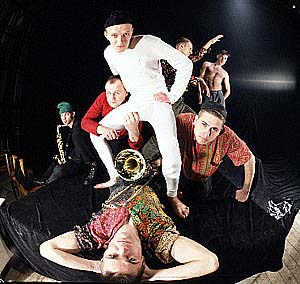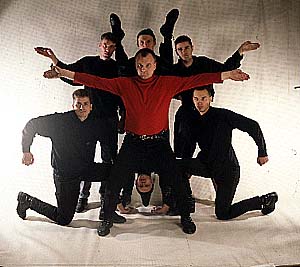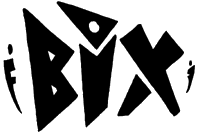Biography:
 BIX is one of the oldest and the best-known bands in Lithuania. They got together in 1987 in the town of Siauliai and in a few months became a cult band. After a period of intensive touring throughout Europe and US they were the most experienced Baltic band, and probably the best known in the West.
BIX is one of the oldest and the best-known bands in Lithuania. They got together in 1987 in the town of Siauliai and in a few months became a cult band. After a period of intensive touring throughout Europe and US they were the most experienced Baltic band, and probably the best known in the West.
After totally obscure beginnings in the underground of their native town, the wave of liberation threw BIX in front of the tens-of-thousands strong crowds at the first huge Freedom meetings and concerts. The restless energy and efficient spirit of BIX songs perfectly corresponded to the "wind of changes" and the band instantly became one of the country's favourites. BIX has been at the top of Lithuanian pop charts ever since, as well.
The next few years were spent in constant touring. BIX participated in number significant festivals in Western end Eastern Europe and played a lot of clubs. Their trips took them to Germany, France, Italy, Poland, Czechia, Slovakia, Netherlands, Luxembourg, Norway, Sweden and twice United States. The band was invited to the famous rock gatherings - Berlin Independence Days and New Music Seminar in New York. Everywhere they played, their music met enthusiastic audience reaction and excellent reviews. BIX even managed to build up a kind of cult following in some countries, which is not an easy task for a foreign band.
BIX had their hard times too. In 1991 a part of the band had a terrible car-crash. The first manager was killed and few members badly injured. It took a long time to recover and start playing again. At that time the overall situation in the old USSR improved to the level where you could make your own records. BIX went into the studio and soon the first album Akli Kariai (Blind Soldiers) was released. It began an extensive discography that not many bands can be proud of. Along with their own albums, BIX songs are included on countless Lithuanian and international compilations.
La Bomba from 1992 was a collection of songs they played in the earliest days but never had a chance to record before. It was the repertoire that made BIX a cult band. Despite the low technical quality of the recordings and the cassette-only format, La Bomba still is one of the most popular BIX albums.
The internationally-orientated debut CD - Doozgle - released in 1993, brought partly new, partly older reworked repertoire in Lithuanian, English and the never-before-heard Doozgle tongue. The album was distributed in France where BIX supported it with a massive promotional tour.
Widely criticised at home for the ignorance of the Lithuanian fans, BIX decided to pay more attention to the native market. The most important event of 1994 was an unplugged-type concert Tikras Garsas at one of the local TV stations. The soundtrack of this unique performance featuring the string section was released on cassette, and three songs on a compilation CD with the same title.
One of the most important works of BIX is the album called simply 7. This digit reflecting the age and the number of members in the band at the time of recording shows up more than once in the lyrics and, citing the authors, is 'nice'. The album was released in different editions on MC and CD. The locally-orientated cassette contains one side of Lithuanian lyrics and few bonus tracks, while the CD is English, except one Doozgle-song. 7 shows darker, heavier BIX with less horns and ska influence than ever before. But even with more conventional arrangements and guitars-bass-drums sound, it's the same old BIX, full of surprises, extravagance and humour.
Unsatisfied with rather mediocre sells of 7 and the impossibility of getting any Western bookings, the band decided to make some significant changes. They separated from their long-time manager, fired both horn players, got Stimorol sponsorship and signed a new record deal with so-called local major Bomba Records. Under new contract BIX released their earliest home recorded album Ziurkiu Miestas (Rats City) on cassette.
 The last record to date - Wor’s - was recorded and mixed throughout the second half of 1996 and was finally released in the beginning of 1997 on CD and MC. It featured 10 new songs. Wor¹s marked the return to more simple and straight-ahead music while Lithuanian-only lyrics’ content was reflected by the promotional campaign motto: Stop Thinking, Let¹s Go Partying. For the first time BIX album cover featured computer design instead of Samas’ painting.
The last record to date - Wor’s - was recorded and mixed throughout the second half of 1996 and was finally released in the beginning of 1997 on CD and MC. It featured 10 new songs. Wor¹s marked the return to more simple and straight-ahead music while Lithuanian-only lyrics’ content was reflected by the promotional campaign motto: Stop Thinking, Let¹s Go Partying. For the first time BIX album cover featured computer design instead of Samas’ painting.
The nucleus of the group was formed by art and music students. They created the original image of the band and still design their albums and shows. During the last few years the members of the band have been involved in different BIX ventures and side projects. BIX made a couple of high quality national and international prize winning videos, participated in exhibitions, and started an eponymous club in Vilnius' old town. In 1997 Samas joined LNK TV music programme Tangomania as a comedy-jock. Shpokas is busy with his live electronics project Sava. The drummer Gintautas Gascevicius gives his services to the number of more and less known bands and won annual Bravo award as a best instrumentalist in 1996.
In fact, recording never was a strong side of BIX. They are a ‘live’ band. One should experience any of their numerous gigs to understand why BIX has generated such excitement and such controversial opinions over so many years. Despite massive support BIX gets lately from its record company and sponsors, they seem to fail in finding their audience. The majority of their older fans are non-interested in any music at all today while the rest probably can’t accept their new populist/stimorolic image. The band seems to be trying to reach a younger audience, but younger fans are looking for coeval artists capable to reflect the thoughts of their own generation. So BIX are left stuck in the fans’ age-gap and one can only sympathise with those truly gifted and extraordinary musicians.
Line-up:
| SAULIUS 'SAMAS' URBONAVICIUS | guitar, vocals |
| MINDAUGAS 'SHPOKAS' SPOKAUSKAS | keyboards |
| GINTAUTAS 'PROFESSOR' GASCEVICIUS | drums |
| SKIRMANTAS GIBAVICIUS | bass |
| AURIMAS POVILAITIS | percussion |
Discography:
| 1. | AKLI KARIAI | 1991 | Lituanus | LP |
| 2. | LA BOMBA | 1992 | Zona/BMK | MC |
| 3. | DOOZGLE | 1993 | Zona/BMK | CD/MC |
| 4. | TIKRAS GARSAS | 1994 | Bomba | MC |
| 5. | 7 | 1995 | Zona/BMK | CD/MC |
| 6. | ZIURKIU MIESTAS | 1996 | Bomba | MC |
| 7. | WOR¹S | 1997 | Bomba | CD/MC |


 BIX is one of the oldest and the best-known bands in Lithuania. They got together in 1987 in the town of Siauliai and in a few months became a cult band. After a period of intensive touring throughout Europe and US they were the most experienced Baltic band, and probably the best known in the West.
BIX is one of the oldest and the best-known bands in Lithuania. They got together in 1987 in the town of Siauliai and in a few months became a cult band. After a period of intensive touring throughout Europe and US they were the most experienced Baltic band, and probably the best known in the West. The last record to date - Wor’s - was recorded and mixed throughout the second half of 1996 and was finally released in the beginning of 1997 on CD and MC. It featured 10 new songs. Wor¹s marked the return to more simple and straight-ahead music while Lithuanian-only lyrics’ content was reflected by the promotional campaign motto: Stop Thinking, Let¹s Go Partying. For the first time BIX album cover featured computer design instead of Samas’ painting.
The last record to date - Wor’s - was recorded and mixed throughout the second half of 1996 and was finally released in the beginning of 1997 on CD and MC. It featured 10 new songs. Wor¹s marked the return to more simple and straight-ahead music while Lithuanian-only lyrics’ content was reflected by the promotional campaign motto: Stop Thinking, Let¹s Go Partying. For the first time BIX album cover featured computer design instead of Samas’ painting.